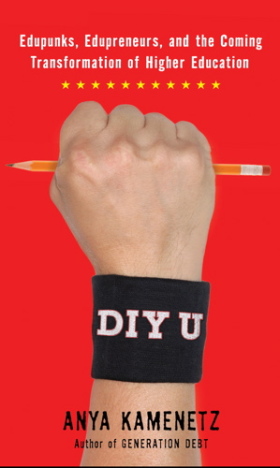Do-It-Yourself Virtual Universities?
 Anya Kamentz has written a new book titled DIY U: Edupunks, Edupreneurs, and the Coming Transformation of Higher Education. She gives us a taste of the argument in a piece for TAP:
Anya Kamentz has written a new book titled DIY U: Edupunks, Edupreneurs, and the Coming Transformation of Higher Education. She gives us a taste of the argument in a piece for TAP:
Since 2001, a growing movement — from the Massachusetts Institute of Technology, Stanford, and hundreds of other universities worldwide to insurgent bloggers and entrepreneurs barely out of school themselves — is looking to social media to transform higher education. They’re releasing educational content for free to the world and enlisting computers as tutors. Google has scanned and digitized 7 million books. Wikipedia users have created the world’s largest encyclopedia. YouTube Edu and iTunes U have made video and audio lectures by the best professors in the country available for free.
The face-to-face learning experience, like the live concert experience, remains inimitable. Research shows that, at its best, hybrid learning beats both online-only and classroom-only approaches. Learners can take in and retain more content faster and more easily, form strong mentoring and teamwork relationships, grow into self-directed, creative problem solvers, and publish portfolios of meaningful work that help jobs find them. These innovations hold out the tantalizing possibility of beating the cost disease while meeting the world’s demand for higher education.
[…]
Higher education is not just an industry. Still, from students’ point of view, colleges do provide a bundle of services. You crack a book or go to lecture and learn about the world. You go to labs or write papers and build a skill set. You form relationships with classmates and teachers and learn about yourself. You get a diploma, and the world can learn about you. Content, skills, socialization, and accreditation.
The Web and allied technologies can make each of these services better, cheaper, more accessible, and even free to the student. Content, whether text, video, audio, or game-based, has progressed the furthest along that path. Interactive teaching algorithms can adapt to your learning style on the fly, allowing you to grasp concepts intuitively and at your own pace. And the Internet hasn’t just changed the way we consume information. It has altered the way we interact. Social media can help students and teachers form learning communities. Reputation, assessment, and certification are held jealously as a monopoly by existing institutions, but new tools and models are knocking on that door, too.
[…]
If you go to MIT’s Web site today, you can find the full syllabi, lecture notes, class exercises, tests, and some video and audio for every one of the 1,900 courses MIT offers, from physics to art history. By the end of 2009, some 65 million current students, aspiring students, alumni, professors, and armchair enthusiasts around the world had checked them out.
[…]
These materials have been accumulating for several years now, but most colleges have yet to fully take advantage of them. Students spend an average of $1,000 a year on textbooks, and faculty spend countless hours preparing and updating course materials, which prompts the question: What will it take for colleges to realize the power of free and open resources and use them to cut educational costs?
Ezra Klein argues that physical universities are unlikely to be replaced by virtual ones so long as a degree from the former remains more valuable to employers. But, dispute the Do-It- Yourself title, I gather she’s not arguing otherwise. Rather, she’s saying that the model employed by physical universities will be forced to evolve. And I think that’s right.
Despite the existence of brilliant lectures and materials online, universities and professor-student interaction will remain crucial to the higher education process. An exceedingly small portion of even our brightest 18-year-olds have the self-discipline to teach themselves, even if given a roadmap. Kamanetz seems to not only acknowledge but embrace this. Aside from efficiencies, it’s simply not possible for even “star” professors to teach hundreds, let alone tens of thousands, of students at a time. So that means there will remain a need for the non-star professors. And while it may well be that textbooks could be written in Wiki form or for the sheer vanity of pageviews — which has, after all, managed to draw some amazing talent to the blogosphere — nobody’s going to spend years in graduate school acquiring the expertise if they can’t make a living in some direct fashion.
What I do see happening — indeed, I presume is already happening — is professors taking advantage of the wealth of material provided by their virtual colleagues in helping put together their courses.
When I first started teaching my own courses in 1994, the Internet as we now know it didn’t exist. There was very little content, most of it gated, and delivery speeds were painfully slow. And so most of us developed courses the way our predecessors had for millennia: cribbing from the syllabi others had created, tailoring to our own interests, picking materials that we’d encountered and found useful, and then evolving over time based on trial-and-error and our own subsequent discovery of materials. Now, there are huge troves of online courses from which professors can get ideas. Tons of free videos. More online reading materials than one could possibly use. Social media tools that can be incorporated. And so forth.
This won’t by any means eliminate the university system. But it should certainly make it better. The days of tenured professors teaching from their old, yellowed notes — mostly apocryphal to begin with — are numbered. Students and department heads will simply demand more.






A subject near to my heart. We pulled our 7th grader out of an allegedly “gifted” school because they were teaching rote and repetition, counting hours of homework as a positive thing rather than evidence of disarray.
Jake’s un-school curriculum now employs books for algebra, lecture video for game theory and anthropology, interactive software for Spanish, books and e-books for reading.
But his real passion is computers and that he teaches himself using a frankly amazing array of books, web sites, Google, hands-on experimentation, social media. Data comes to him, or he goes to the data, it’s both passive and active, both general and specific, and it flows both to him and out from him to others and to his two aging parents it’s so profoundly different that we don’t fully grasp it.
Education in this country has barely begun to adapt to the 20th century. They are not adapting to the 21st. These schools that talk about “having computers in the classroom” and then forbid the use of Google or WikiPedia and outlaw iPhones and iPads aren’t adapting, they’re just going through the motions.
Data is everywhere, and yet are kids are still taught largely by rote.
These schools forbid the use of Google as a research tool for papers, or for use during exams?
Higher Ed has needed to evolve for decades. The problem is faculty and staff don’t see that evolution in their interest. That brings up the basic problem, the interests of the students are no longer the primary interest of the institution. The growth in administrators and the inexcusable rising costs are evidence of the entity becoming more concerned with itself instead of it’s purpose.
?
I have no idea what higher education is like now. None. However, back in the mists of the distant past nearly a half century ago when I was in college the level of interaction between professors and students in my top-tier university was nominal except in a handful of classes. Even classes with fewer than twenty students were lecture classes in which the prof walked in (frequently late), gave his lecture, and walked out. Papers and tests were graded by TAs who were rarely if ever seen.
I will grant that the bare handful of classes in which there was significantly more interaction were the best I took and I learned the most there. They amounted to fewer than 5% of all of the classes I took.
Interaction other than social interaction among students was nominal as well. If I got to know those who took classes with me it was because I sought them out, not because it was part of the process.
How would a virtual university be different from that? Other than that I could attend classes in my pajamas. Or without them for that matter.
I’m not sure that they’ve ever been the same, at least at large universities, but the real question is, what would you suggest to fix the system? I’d be interested in hearing both idealistic answers (“If I were emperor of the US…”), and politically plausible ones.
I believe a commenter has linked to edupunks here before 😉
Despite the similarities in our positions, I detect a defensive strategy on your part. Why else would you take that naked assertion as a natural law?
Are we to believe that all secondary schools equally prepare students for lifetime learning?
And if they some behind, is there any reason to believe that a traditional 4-year university, with every course a traditional lecture, is necessary?
I don’t think so. I think there is just a trailing defense of the status quo.
Sorry, “And if they leave some behind”
Anon:
He was assigned a paper on media in North Korea and told the source could only be a physical book. Mind you he wasn’t given a book, just told to find one. And the only one we could find was of course off-topic and outdated.
This at an 18k a year private gifted school.
Education in this country at all levels is utterly unprepared for this revolution that’s occurred. Absolutely, completely clueless. And this should be when the US really shines because we are the great adapters, the people who value individual initiative and flexibility. We ought to be showing the way forward.
But of course our educational system is mired in politics — unions on the left, luddites on the right. Everyone and his brother has some facile, formulaic, “this will fix everything” approach to the problem. We’re still fighting the culture battles of the 1960’s at a point where kids can instantly access all the data in the world from physics lectures to fetish porn.
Schools don’t even have the bare beginnings of a glimmer of an idea how to adapt.
Michael, that doesn’t make sense to me.
I teach at the college level and in Computer Science, so I’m sure that my observations don’t really apply very broadly. For example, I don’t have writing assignments, only programming assignments.
I would actually prefer to allow Google during tests, but unfortunately I have no way of ensuring that they don’t use their laptops to communicate with other people, so I disallow laptops during tests. Tests are always open book, notes, whatever.
I mean, it doesn’t make sense to me that he was not allowed to use authoritative online sources for his paper on North Korea.
Anon:
I know. It’s insane.
So is teaching kids to write by the “chunk” method. Literally forcing kids to write awkward, poorly-constructed sentences and paragraphs in order to comply to a formula. (Not so popular in a home where both parents write for a living.)
Or a teacher plagiarizing all her test questions directly from Spark Notes and imagining the kids won’t discover it. Or, for that matter, threatening to sue students for dissing the school on Facebook. Or piling on hours of repetitive review homework in which the assumption seems to be that “showing work” proves understanding — not realizing Wolfram Alpha is happy to “show work.”
The stupid runs deep in some parts of the educational system. And again: private school with very prosperous parents.
Moving beyond the stupid things, one thing I don’t see discussed very often is whether or not there are any skills that are important for the future that students are not being taught. One possibility is how to use search engines effectively. For example, being able to construct boolean searches and think of the right keywords, etc., is huge advantage. A related skill is the ability to quickly search through several hundred hits, separating the wheat from the chaff.
Another one is mental modeling. There is some evidence to show that the reason some people simply cannot learn how to program computers is not a lack in any traditional measure of intelligence, but rather a lack in their ability to construct and mentally execute models of machines. Such deficits may also impact other ways of functioning in a “cyber world”.
I am nearly finished with an online degree. Suffice it to say that I will not willingly open a Kindle or a Nook to read. I prefer a hard text.
Granted, I have made use of online resources. But where online education and electronic resources fail are in accessibility and speed.
27 years ago, in the lower division classes, you sat in a lecture hall. The closer you moved toward your degree (and the higher the course numbers), the smaller the classes, and the instruction was along the lines of mentoring.
If I need to get a tutorial from my professor, I have online access 24/7. But the speed at which he or she responds is anywhere from 24 to 48 hours. Not only that, sometimes it has taken several emails…and by that time, the course is halfway over or the question and answer is irrelevant.
The texts that need updating are not necessarily math texts, but ones that deal with law and policy regarding taxes, social issues and so on.
Free is good, but having a live mentor is better.
Should I decide to get a post-graduate degree, I am opting for a brick and mortar school with honest to goodness real people and a professor with office hours. Especially one who does not have a cheeky illiterate writing assistant who can’t spell or read.
When I voiced my concerns to the university I attend, they did respond and some things got better immediately. Cyber school is good for the convenience, but you still have deadlines and the usual screening for plagiarism. Another part of this is since you can’t see your fellow students, you don’t know what race they are unless they bring it up. Some will, some won’t. It depends on the subject.
I am not saying that to be racist, but to point out that in a discussion, people will get their feelings hurt and some just want to let others know what they are, JIC. It is a defense mechanism, I guess.
If someone wants to do a study on that, it is an easy PhD.
Anon:
I’d be the first to admit I don’t have any brilliant insight into how we’re going to adapt the educational system. I’m coming at this with only my personal experience, and my experience as a parent, to work from. I can only observe that the education system didn’t work for me, and doesn’t work very well for my daughter who has some LD issues, and it is actually destructive to my son.
It’s frustrating. I spend a fair bit of my time defending my kids from education system in the hopes that they can get an education.
I have a son who is in special education. He is gifted in art, and is physically very strong. So, the education system has catered to his strengths while focusing on helping him cope.
We have a good working relationship with his teachers and the supervisors. It doesn’t hurt that one of them is prior service and a retired officer.
However, if your school does not meet her needs, you can get an independent assessment for her, and see if there is a school in the district who can. Here in GA it is a state law that if the child’s needs through SE are not being met, the parents can take the child to the school that will work with him or her. They can cross district boundaries.
That is a good thing, but you need to make sure a law like that is on the books in your state.
The severity of the issue and her records will be a determining factor.